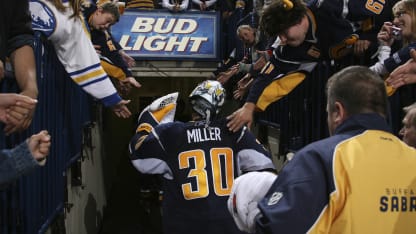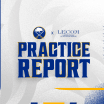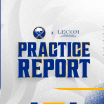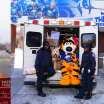Miller was drafted by the Sabres during the fifth round in 1999 and came to town three years later, a 22-year-old who had just attended college in his hometown of East Lansing, Michigan. Rochester and Buffalo represented his first big step into the real world.
"I feel like I really grew up there," he said.
The hundreds of messages that poured in on social media Thursday were indicative of just how many people in Buffalo grew up with him. It all begged the question: What more could he have given?
He was notoriously committed to his craft. Teammates spoke of a Hasek-ian competitiveness in practice and an intimidating focus on game days. His pregame meditation - stoic, standing on the bench with his face leaning against the knob of his stick as he stared upon the empty ice surface - became as iconic an image as any of his sprawling saves.
Miller joined a franchise that boasted eight Vezina Trophies won by four different goaltenders and became its all-time wins leader. He carried that same level of commitment into his final seven-plus seasons with St. Louis, Vancouver, and Anaheim, becoming the winningest U.S.-born goaltender in NHL history. More than two decades of such sustained focus came at a cost.
"It actually takes its toll," Miller admitted. "I think I was very much a different person probably before I was starting as many games as I did through college and into pro hockey. I think you start to get kind of consumed about preparation and you feel the weight of the responsibility when you're a starting goaltender.
"I think that's why people kind of see a lot of the starting goaltenders and maybe some of the things they say or do and maybe they seem a little bit aloof or they don't have energy for certain conversations. I know I went from having more of a social time to having just times where I would be, weeks on end, I would just be at home just resting or eating dinner at home."
He was generous with the time he did have. Miller became a regular in the pediatric wing at Roswell Park Comprehensive Cancer Center, known among staff for his authenticity and willingness to attend any event presented to him. He visited Roswell during one of his first trips back to Buffalo as a member of the Canucks and continued to meet with patients after games as a visiting player.
"It was very unique involvement," said Robin Nusbaum, who managed the Courage of Carly Fund (then known as Carly's Club) at Roswell and worked directly with Miller. "He would just text me sometimes and say, 'I'm off today, I don't have practice, can I come up to the hospital?'
"It was really a personal involvement and a personal desire to give back and be part of the community and to be able to lift the spirits of our pediatric cancer patients at Roswell."
The iconic sock-turned-toque that Miller donned above his mask during the inaugural Winter Classic was conceived as a fundraiser for his Steadfast Foundation. Just last year, Miller emptied out his attic and held a used equipment auction with a portion of proceeds benefitting FeedMore WNY and the Buffalo Police Athletic League.
Miller said he hopes retirement will allow a visit to Buffalo with his wife, Noureen, and their six-year-old son, Bodhi.
"The city has a big piece of my heart and I'd like to definitely bring my family back, bring my son back and kind of show him like, 'This was a big part of dad's life before you showed up and it's important you get to know a little bit about it,'" Miller said.
He can tell him he gave the city everything he had.



















